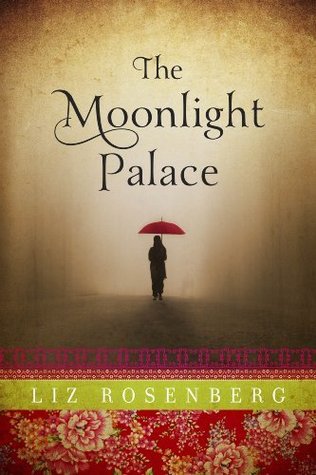I'm a fan of historical fiction and book deals, so when Liz Rosenberg's The Moonlight Palace popped up on my Amazon recommendations - I bought it. I actually ended up getting a discounted Audible version of the story as well and started listening to it on my daily commute. I really enjoyed listening to a professional narration with correct annunciation and the performance of accents - it really brought the story to life in my mind.
The Moonlight Palace is narrated by a teenager by the name of Agnes "Aggie" Hussein. Aggie lives in Singapore in the 1920's in a dilapidated palace called the Kampong Glam. The Hussein family was once a kind of royalty and the palace was once an opulent relic handed to her family in exchange for the family handing Singapore over to the British. Now the family lives in poverty, the palace is in ruins, and Aggie is facing the very real possibility that she may lose her family home; a home that is ingrained in her blood.
Wednesday, December 31, 2014
Monday, December 22, 2014
Book Review: "Slaughterhouse-Five" by Kurt Vonnegut
I've been trying to catch up on some of the classics I never read in school, and Slaughterhouse-Five is one of those books. I'm actually glad I didn't read this in high school, because I wouldn't have been able to comprehend all of its themes. Part autobiography, part absurd, part satire, part science fiction and part war drama - this isn't a story that fits neatly into any specific genre. I can imagine that the first mention of Billy Pilgrim coming unstuck in time and his alien abduction by the Tralfamadorians would cause some readers to close the book and push it away. However, it is this plot aspect that not only functions as an example of Billy's war warped mind, but also as a narrative tool used by Vonnegut to tell a non-linear story.
The narrator of the story is Kurt Vonnegut, he doesn't call himself Kurt Vonnegut, but after listening to an interview with him, I can say with authority that the narrator is a man writing a story about a man writing a story about the WWII massacre at Dresden (very postmodern meta-fiction). The frame story is told in first person perspective and introduces us to the historical event that was the fire bombing of Dresden, Germany. The narrator/Vonnegut talks about how hard it has been to write a story about Dresden, "because there is nothing intelligent to say about a massacre." So what follows is Vonnegut's disjointed tale of Billy Pilgrim that doesn't feel disjointed at all, but rather a well composed and complete story that isn't told in chronological order. You have to be a really good writer to pull off this kind of story telling and make your reader feel like the story couldn't have been told any other way, despite the absurdity of it all.
Monday, December 15, 2014
Book Review: "The Paying Guests" by Sarah Waters
There was once a time when I despised British Literature. I declared my track in college as "Contemporary American Literature," and left the likes of Tristam Shandy and Pamela in my dust. I appreciated the Romantic and the Gothic era, but I still preferred American Lit. However, I really love what's coming from British writers these days. Kate Atkinson's Life After Life, pushed me into a new reading pool that I absolutely adore, and Sarah Waters has now deepened my affection.
The Paying Guests takes place in London in 1922. Anything written between 1900-1945 already has my attention because I'm fascinated by this time in History. London is still in tatters after the first World War, veterans are broken men with menial prospects, and once prominent families face the reality of their wavering wealth. Frances Wray lives in the upper-class neighborhood of Champion Hill, only with the loss of her two brothers in the war and her father to bad health, she and her mother are left with a large old house they can't afford and a former lifestyle they can't maintain. The Wrays lost their wealth due to bad investments and now must take on "paying guests" to stay afloat.
Tuesday, December 2, 2014
Book Review: "Wild" by Cheryl Strayed
There's something about the vulnerability inherent in the art of memoir that makes reading them an exploration of the human condition. My exposure to memoir has been limited, but every time one of these stories lands on my reading list I know I am in for a special kind of journey. Cheryl Strayed's Wild: From Lost to Found on the Pacific Crest Trail is a gritty and honest reflection of the author's months log journey by foot across California and into Oregon on the Pacific Crest Trail (PCT).
Strayed took to the trail during the great meltdown of her life. Her mother died from cancer at the age of 45 which sent her into a grief driven downward spiral resulting in cheating on her husband, a heartbreaking divorce and a heroin addiction. All of this is revealed to the reader in flashbacks as Strayed makes progress on the trail. Strayed's prose is deliberate and clear, which makes following this clueless 26-year-old on a dangerous solo journey through the pacific wilderness a little less infuriating than if she attempted to sugar coat all of her reckless decisions.
Subscribe to:
Posts (Atom)



